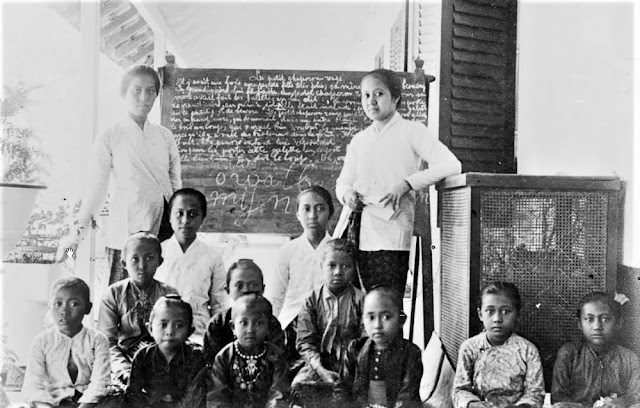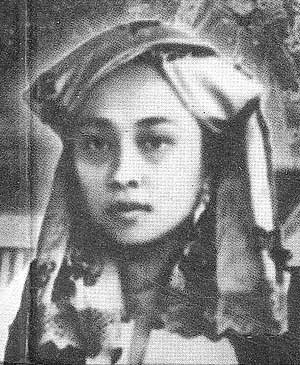 |
| Kartini in her school |
Hari Kartini, Kartini Day, is celebrated in
Indonesia on April 21, for the anniversary of the birth of this very important
female figure who has meant a lot for female emancipation.
I have already written about her in this blog.
To remind.
Raden Ajeng Kartini was born in 1879, the daughter of a second
wife of Raden Mas Adipati Ario Sosroningrat, a noble regent of Jepara, in
Central Java. She was among the first Javanese women to receive training in a
Dutch school. She stayed in school until the age of 12 and has close
relationships with several Dutch friends.
She only lived for 25 years, but her name has
remained legendary: her birthday, April 21, is celebrated across the country to
revive her message to all Indonesian women so that they could be free to
study.
She wrote many letters to express her views on
the social conditions of Indonesian Native women of her time. This
correspondence has been collected in two famous books: Abendanon's Husband
collected 106 letters from Kartini to his wife and some of her letters to
others and published them in 1911 as “From Darkness to Light”. Another book,
“On Feminism and Nationalism”, translates the complete texts of the 14 letters
to Zeehandelaar, a young Dutch feminist.
So she wrote, for example, against the polygamy she hated.
“And can you imagine
what hellish pain a woman must experience when her husband comes home with
another whom she has to recognize as his lawful wife, her rival? He can torment
her to death, mistreat her as much as he likes for as long as he chooses not to
give her her freedom again; she can whistle to the wind for her rights!
Everything for the man and nothing for the woman is our law and general belief.”
(Letter to SZ, 6
November 1899, On Feminism and Nationalism, 34-35).
Just to make people understand the vigor with
which she carried out her ideas. And we are talking about a girl who was
already opposed to an arranged marriage at the age of twelve.
In these times of tough female struggles, it is my great regret to see how Kartini is largely unknown in the West, at least in Italy.
But if her fame, despite being ignored by us,
is still honored every year in Indonesia, the same cannot be said for other
very important female heroines not so celebrated as Kartini, even if they have
been awarded the same title of National Heroes and have names of streets and
schools dedicated to them.
I, therefore, want to give credit here to
four women pioneers of women's education and political activism.
 |
| Rohana Kudus |
The first woman is Ruhana Kuddus, or Rohana Kudus (20 December 1884 – 17 August 1972).
Rohana Kudus was the first Indonesian
journalist, founder of the Soenting Melajoe newspaper, and activist for
women's empowerment.
Siti Ruhana was born on 20 December 1884, in
the village of Koto Gadang, the regency of Agam, in the hinterland of western
Sumatra, at the time the Dutch East Indies. Her father Mohammad Rasjad Maharaja
Soetan was an important official and among her relatives had famous politicians
and intellectuals, including the Indonesian poet Chairil Anwar.
At age 24, Ruhana married Abdoel Koeddoes, a
notary, and became known as Roehana Koeddoes, with her husband's continued
support in her passion for education, which began to take shape in 1905 when
she set up an artisanal school in Koto Gadang.
But it was in February 1911 that Ruhana founded
a more organized women's educational association, called Kerajinan Amai Setia,
which is a school specifically aimed at teaching girls, in addition to the
usual household tasks, trades, and skills such as reading Jawi and Latin
writing and to manage a household.
Despite initial opposition from those who did
not look favorably on women's progress, Ruhana managed to attract about sixty
students, until in 1915 the government officially recognized the school,
becoming an artisan center that collaborated with the Dutch government.
Koeddoes always accompanied in her life on the
one hand the teaching and education of women and on the other her passion for
writing and journalism. Her idea was to start a women's-oriented newspaper, and
on 10 July 1912, the first issue of Soenting Melajoe (EYD: Sunting
Melayu), a Malay-language newspaper with women as readers, was launched. The
newspaper's name referred to the sunting, a traditional headdress worn
by women, but it was also a play on words meaning to modify or correct. The
newspaper's intent was to fill a gap in information that was predominantly in
Dutch and women at the time had little access to Malay-Indonesian language
texts: the newspaper's themes were current issues, traditionalism, polygamy,
divorce, and education of girls.
Roehana Koeddoes died in Jakarta on August 17,
1972, and was buried in the Karet Bivak cemetery.
In 1974, the West Sumatra regional government
honored her as the first female journalist (Wartawati Pertama). She was also
honored as a pioneer of Indonesian printing (Perintis Pers Indonesia) in 1987
and Star on Service, 1st Class (Bintang Jasa Utama) in 2007.
Since 7 November 2019, the Indonesian
government has declared Roehana Koeddoes National Hero of Indonesia.
 |
| Raden Dewi Sartika |
To continue on the theme of education and women's emancipation, Raden Dewi Sartika (4 December 1884 – 11 September 1947), supporter and pioneer of education for women in Indonesia, cannot fail to be mentioned.
Born in Cicalengka, a sub-district of Bandung,
Sartika, despite the fact that during the colonial era girls were rarely able
to enroll in school, she managed to complete her school studies thanks to the
tenacity of her parents, who were noble and st
Therefore Sartika grew up with her uncle who
educated her in Dutch and Western culture.
From an early age, Dewi showed interest in
education by pretending to be a teacher when she played with other children in
her community. She learned to read and write, unlike many other girls her age,
during her schooling, in turn teaching those who frequented her. Thanks to this
she realized the level of inferiority to which women were relegated in the
society of the time and how education was the weapon to combat this injustice.
In 1902, once her mother was thrown out, she
moved to Bandung and began to work stubbornly to achieve her goal: to open a
school for teenage girls, and to do so she had to seek the approval of the
authority, which is not easy given who was considered the daughter of
“insurgents”, but her perseverance and her modern vision of education convinced
the Dutch inspector to agree.
In 1904, at the age of 20, Dewi Sartika
launched her own school for teenagers called Sekolah Istri (Wife's
School). The school was really small, consisting of only two classes, attended
by only twenty students which might seem small, but for the time this school
was considered a cornerstone of education in Indonesia.
Lessons included religion and teaching reading,
writing, counting, sewing, and crocheting.
Two years after her school was established,
Dewi Sartika married her husband, Raden Kanduruhan Agah Suriawinata, also a
teacher and a great supporter of his wife's work.
The school grew quickly with the support of the
whole community and its spaces were very small, therefore the school opened
again in another larger environment becoming Sekolah Keutamaan Istri
(The School of Wife's Virtues).
Sekolah Keutamaan Istri officially moved in
1910. Since then it became an inspiration for other teachers and other schools
opened in different locations in the region leading Sartika to create an
organization – called Organisasi Keutamaan Istri – which protected and
regulated the education system according to a fixed program defined by Dewi:
in 1913 there were over 250 students and about 12 teachers in schools.
In September 1929, Sekolah Keutamaan Istri
celebrated its 25th anniversary by receiving a reward from the government of
the Dutch Indies. The government granted them a permanent building and the
school was again renamed Sekolah Raden Dewi.
Unfortunately in 1942, the Japanese defeated the
Dutch during the East India campaign in World War II.
All her schools were closed forcing Dewi
Sartika to go into hiding and during that time she became seriously ill. Dewi
Sartika died on 11 September 1947 in Cineam, Tasikmalaya, due to her
deteriorating physical condition.
In the 63 years of her life, Dewi Sartika has achieved indescribable results and has left a fundamental message for all women of her generation, inspiring them to always be courageous.
On 1 December 1996, Sartika was awarded the
title of National Hero.
TO BE CONTINUED...

When I read your article it reminds me when I was in school ... I studied the history of Indonesia and women's emancipation when I was in Form 6 Upper Secondary.
ReplyDeleteWomen's emancipation is the process of freeing women from low socioeconomic status or from legal restrictions that limit the possibility of growth and development.
The writers from Singapore such as Syed Shaykh Al-Hady is one of the one who use novels to make the Malay community aware of the importance of educating girls as highlighted in Hikayat Faridah Hanum and Hikayat Puteri Nurul Ain...both novels inspire me to continue to learn and become a successful woman.
Nice sharing Tuan...thank you so much.
Thanks a lot for feedback, wait the second part ✌️😊
DeleteI never know the other names than Kartini, that as a pioneer of the women education.
ReplyDeleteBoth two of them Ruhana and Raden Dewi Sartika, were supported by their husband. It was great read about them.
Can't wait for part 2!
Your writing is great as usual. So impressed! 😍
Really thanks 🙏🙏
DeleteJust amazed, as always. It is as if i am attending a history class with much interest on the topic. Those heroic ladies deserved the honor because they contributed a lot when it comes to women empowerment. Salute to you too for choosing this topic.
ReplyDeleteDeeply thanks ✌️😊
DeleteGood articles of women emancipation. I knew about Siti Ruhana and Dewi Sartika before but there were not much infomatian of them compare to Raden Adjeng Kartini. Congratulations. Thanks for sharing..👍👍👍
ReplyDeleteThank you a lot! Wait next 2 ✌️
Delete